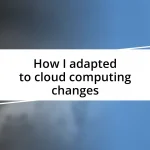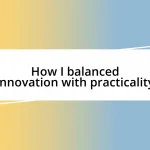Key takeaways:
- CRISPR and genetic editing advancements hold potential for eradicating genetic diseases but raise ethical concerns about “designer babies” and societal inequalities.
- The history of genetic manipulation has evolved significantly, from recombinant DNA experiments in the 1970s to increasing ethical debates in the 2020s.
- Future prospects for genetic editing include personalized medicine and enhanced agriculture, but these advancements must be balanced with ethical considerations and equitable access.

Understanding genetic editing impacts
Genetic editing, particularly tools like CRISPR, is transforming how we approach everything from agriculture to medicine. I still remember attending a seminar where a scientist passionately explained how these advancements could eliminate genetic diseases. It struck me—imagine living in a world where inherited ailments like cystic fibrosis might become a thing of the past. Isn’t that a tantalizing possibility?
However, the impacts of genetic editing aren’t just about eradicating diseases; they also raise complex ethical questions. For instance, who decides which traits are desirable? This topic reminds me of a conversation I had with a friend who was skeptical about the potential for “designer babies.” Her concerns highlighted to me that, while the science sounds incredible, we must tread carefully and address societal implications.
Additionally, we must consider the potential ecological effects when editing genes in plants and animals. One day, I visited a local farm that implemented genetically modified crops, and the farmer proudly shared how it increased yield and resisted pests. Yet, I couldn’t help but wonder: what happens to the biodiversity of our ecosystems when we introduce such alterations? It’s a complex tapestry of advancement and caution, demonstrating just how deep the impacts of genetic editing can reach.

Historical context of genetic editing
Throughout history, the concept of altering genetic material has evolved significantly. The first notable instance of genetic manipulation dates back to the early 1970s, when scientists created recombinant DNA, leading to a profound leap in both agriculture and medicine. I recall attending a lecture back then, where a pioneer in the field shared the excitement that this breakthrough could revolutionize how we understand heredity. It was a pivotal moment, showcasing the potential for molecular biology to reshape life as we knew it.
- 1973: The first recombinant DNA experiment was conducted, allowing scientists to splice genes together.
- 1980s: Genetically modified organisms (GMOs) began to appear in agriculture, introducing crops resistant to pests.
- 2000: The Human Genome Project was completed, mapping all human genes, which laid the groundwork for future genetic editing technologies.
- 2012: The introduction of CRISPR technology brought gene editing into the spotlight with its precision and relative ease.
- 2020s: Ethical discussions intensify around genetic editing’s implications in humans, especially regarding “designer babies.”
Reflecting on these milestones, I can’t help but feel a mix of excitement and apprehension. Each advancement brings us closer to powerful solutions but also prompts deeper ethical questions. I often wonder, amid these breakthroughs, how we can strike a balance between innovation and moral responsibility in our ongoing quest to shape life itself.

Ethical considerations in genetic editing
In navigating the ethical landscape of genetic editing, I often find myself asking essential questions about our responsibilities. One thought that lingers is, who has the right to determine which genetic traits are deemed “better”? During a discussion with my colleagues, one of them expressed concern over the possibility of creating inequalities based on genetic enhancements. This conversation opened my eyes to the potential societal divide that could arise, raising fears of a world where access to genetic editing becomes a privilege for the wealthy.
Moreover, the implications of altering the human genome can resonate deeply on a personal level. I once encountered a family dealing with a hereditary condition, and their hope for breakthroughs in genetic editing seemed both exhilarating and daunting. It made me realize that while the idea of curing genetic disorders is wonderful, the uncharted territory of editing our genes raises significant questions about consent, especially for future generations who cannot voice their perspectives. We might be playing the role of gods, but we must tread lightly, considering the long-term impact of our decisions.
Finally, the ecological considerations we face when implementing genetic editing in agriculture cannot be overlooked. I visited an organic farm where the farmer voiced a concern that echoed in my mind: what if genetic modifications lead to unforeseen consequences? This notion left me with a sense of urgency to explore the balance between innovation and its potential destructive effects on the environment. It’s a delicate dance between progress and ethics that warrants careful consideration.
| Topic | Ethical Considerations |
|---|---|
| Human Enhancement | Creating societal divides based on access and outcomes. |
| Consent | Future generations may be edited without their agreement or understanding. |
| Ecological Impact | Potential risks to biodiversity and ecosystem stability. |

Potential risks of genetic editing
When I think about the potential risks of genetic editing, I often recall a discussion I had with a fellow researcher who was deeply concerned about unintended consequences. Imagine editing a gene to improve a crop’s yield, but then it accidentally reduces its nutritional value. It raises an important question: how can we ensure that our well-intentioned modifications don’t backfire in unexpected ways? It’s a humbling thought, reminding me that nature often has a way of resisting our alterations.
There’s also the emotional weight of possibly erasing certain traits that define individuals. I once met a couple who had spent years grappling with a genetic condition. They spoke passionately about their family history and how it shaped their identity. Would gene editing strip away the unique tapestry of human experiences? I can’t help but worry if we might lose valuable aspects of what makes us, well, human.
On a broader scale, consider the scenario of genetic editing leading to biological phenomena we can’t fully predict. I participated in a community workshop where a biologist pointed out that editing one gene might inadvertently affect others. Isn’t it unsettling to think about the ripple effects we might unleash? Navigating this complex landscape feels like walking a tightrope, where one misstep could endanger much more than we can anticipate.

Future prospects of genetic editing
As I gaze into the future of genetic editing, I can’t help but envision a world where we might not only eradicate genetic diseases but also enhance human abilities. It excites me to think we could push the boundaries of what it means to be human. But then, a question creeps into my mind: at what cost? I remember chatting with a friend who fears the notion of “designer babies” could create a society fixated on superficial traits rather than embracing individuality.
There’s also the possibility of genetic editing revolutionizing medicine by personalizing treatments to an unprecedented degree. I think back to a patient I once encountered, whose struggle with a rare condition could potentially be alleviated through customized gene therapies. However, the prospect of individualized medicine raises another question: how do we ensure that these advances are accessible to everyone and not just a privileged few? Witnessing innovative solutions in healthcare is inspiring, yet I often wonder about the equitable distribution of these life-changing technologies.
Lastly, I contemplate the implications for agriculture, where genetic editing could redefine food production. Imagine standing in a future farm where crops thrive in harsher climates, potentially addressing food shortages. That thought brings a sense of hope. Still, it begs the question: how can we balance this with the preservation of traditional farming methods? Reflecting on a recent visit to a community garden, I felt the passionate connection people have with heirloom varieties; there’s beauty in diversity that genetic editing must respect. As I consider these future prospects, I realize they are as much about hope as they are about responsibility.














